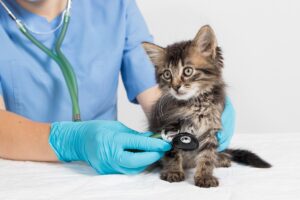
Mount Carmel Animal Hospital shares more information regarding FeLV and its impact on cats in this article.
Feline leukemia virus, or FeLV, is one of the most prevalent and significant infectious diseases in cats, especially in the United States and Canada. Fortunately, the incidence of FeLV in cats has decreased in the past two decades due to enhanced vaccine and testing development. Mount Carmel Animal Hospital shares more information regarding FeLV and its impact on cats in this article.
What is the Feline Leukemia Virus?
Feline leukemia virus (FeLV) is a type of retrovirus that may be incorporated into a cat’s genome and might not be cleared over time. Any close contact among cats may spread FeLV, including mutual grooming, bite wounds, or sharing litter boxes and feeding dishes. Transmission may also occur from an infected mama cat to her kittens, either before they are born or while nursing.
Transmission of FLV
The cats that are at greatest risk of contracting FeLV infection are:
- Those exposed to infected cats
- Cats living with infected cats or those with unknown infection status
- Felines allowed outdoors unsupervised where another infected cat can bite them
- Kittens born to infected mothers
Clinical Signs
The feline leukemia virus affects a cat’s immune system in many ways, primarily in cancer form. During the early stages of infection, it’s common for cats to remain completely asymptomatic, demonstrating no signs of disease. Over time, an infected cat’s health might progressively deteriorate, experiencing the following signs:
- Progressive weight loss
- Appetite loss
- Poor coat condition
- Persistent fever
- Enlarged lymph nodes
- Pale gums and other mucus membranes
- Infections of the urinary bladder, upper respiratory tract, and skin
- Persistent diarrhea
- Various eye conditions
- Seizures and other neurological disorders
Diagnosis
More than one exam is typically necessary to accurately diagnose FeLV since every cat reacts differently. No single test is sufficient to determine if a feline has a progressive FeLV infection. Moreover, two types of blood exams are commonly used to diagnose FeLV initially.
- The enzyme-linked immunosorbent assay (ELISA) is typically run in a vet’s office as a screening tool. These tests detect the presence of free FeLV particles.
- After a positive ELISA test confirms FeLV infection, the indirect immunofluorescent antibody assay (IFA) test is typically sent to a diagnostic laboratory as confirmation.
Treatment
Even though some therapies lower the amount of FeLV in the bloodstream of affected kitties, these therapies might have substantial effects and might not be effective in all cases. Unfortunately, FeLV is not curable. Veterinarians treating FeLV-positive cats showing signs of disease typically treat specific problems caused by the virus, such as performing blood transfusions for anemia or prescribing antibiotics for bacterial infections.
Prevention
The only way to 100% protect cats from the feline leukemia virus is to prevent their exposure to other infected cats. We recommend keeping your cat away from other potentially infected cats. Also, any new cats should be tested for FeLV before introducing her or him to their new home, and infection-free felines should be housed separately from new cats until their FeLV status is known. Although a vaccination for FeLV is available, no available vaccine is 100%, so please consider reducing the risk of infection for cats at risk of exposure. Infection-free cats should be housed separately from infected cats.
Prognosis
Even though a diagnosis of feline leukemia virus can be emotionally devastating, it’s significant to know that felines with FeLV can live normal lives for a long time. However, pet owners should seek immediate veterinary assistance if they notice signs of abnormality or illness.
HERE AT MOUNT CARMEL ANIMAL HOSPITAL, WE’LL TREAT YOUR PETS LIKE FAMILY!
Mount Carmel Animal Hospital has been serving the Northern Baltimore/Southern York community for over 30 years and is proud to be an independently operated, small animal practice committed to excellence in veterinary medicine and client service. From grooming to wellness services, along with Canine Life Skills Training Courses, and surgical procedures, we have the expertise that will best serve the needs of you and your pet. Contact us at 410-343-0200 and follow us on Facebook
